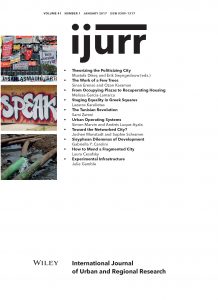This article stages a dialogue between Jacques Rancière’s political writings and the squares movement in Greece. From May to July 2011, a heterogeneous multitude of protesters reclaimed the squares of the country from their allocation in the police order and articulated a multiplicity of divergent discursive, organizational and spatial repertoires. This was an urban political event that reasserted the importance of urban spaces in expressing political dissent and experimented with new ways of being and acting in common. This article draws on Rancière’s conceptualization of politics to read the squares movement as an opening of spaces of political subjectification. At the same time, through a close ethnography of the squares, it highlights the tensions that marked this process and focuses on two of these: the coexistence of nationalist and equalibertarian discursive and performative repertoires and the co-implication of horizontal and vertical organizational practices. The article builds on this analysis to argue that the squares movement opened hybrid spaces of political subjectification and to explore some of the tensions in Rancière’s political writings. This reading, in turn, informs a discussion of the legacies of the squares movement.

